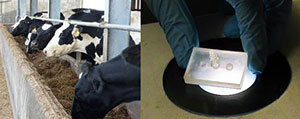 A USDA grant will help a team of researchers develop a test for pathogens in dairy products such as milk.
A USDA grant will help a team of researchers develop a test for pathogens in dairy products such as milk.
A team of researchers from the University of Notre Dame and Purdue University has received a three-year grant of $500,000 from the U.S. Department of Agriculture to develop a new technology that can rapidly test milk and other dairy products for harmful pathogens.
Though the research will be applicable to many microorganisms, the team’s first goal is to reduce the incidence of brucellosis, a condition caused by infection from Brucella bacteria, various strains of which are found in sheep, goats, cattle and swine. Brucellosis is the most common animal-to-human infection worldwide, with more than 500,000 new cases reported each year. It rarely causes death, but it can result in prolonged health problems.
“The infection is usually acquired by ingestion of contaminated animal products, typically raw milk and other unpasteurized dairy products such as soft cheeses,” says Ramesh Vemulapalli, professor of veterinary immunology and microbiology at Purdue and a collaborating investigator on the project.
“Although it is rarely seen in developed countries, there is growing concern that these pathogens are spreading because of increased global tourism and immigration.”
The researchers are using the USDA funding to design and build a portable device that can analyze a food sample and provide a reading within 15 minutes.
The technology is based on a microfluidic detection platform developed in the lab of project leader Chia Chang, Bayer Professor of Chemical and Biomolecular Engineering at Notre Dame and an investigator in the University’s Advanced Diagnostics and Therapeutics initiative.
“Our system is very sensitive and selective,” explains Chang. “We can take a sample, concentrate the microorganisms in it and then detect fewer than a hundred bacteria per milliliter.”
One major technical challenge is pretreating the milk before it hits the instrument’s sensors.
“There are many solids and large molecules, such as fat, in milk,” says co-investigator Arun Bhunia, professor of food science at Purdue. “We are working on a way to incorporate a quick and seamless pretreatment phase into the system.”
Team members are also focused on usability and design, because they want the device to be functional for people without high levels of technical training.
Advanced Diagnostics and Therapeutics — a component of Notre Dame’s Strategic Research Investment initiative — is dedicated to developing tools and technologies to combat disease, promote health and safeguard the environment.
Contact: Chia Chang, 574-631-5697, hchang@nd.edu